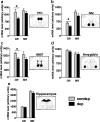Corticosteroid-dependent plasticity mediates compulsive alcohol drinking in rats
- PMID: 22649234
- PMCID: PMC3375621
- DOI: 10.1523/JNEUROSCI.0069-12.2012
Corticosteroid-dependent plasticity mediates compulsive alcohol drinking in rats
Abstract
Alcoholism is characterized by a compulsion to seek and ingest alcohol, loss of control over intake, and the emergence of a negative emotional state during abstinence. We hypothesized that sustained activation of neuroendocrine stress systems (e.g., corticosteroid release via the hypothalamic-pituitary-adrenal axis) by alcohol intoxication and withdrawal and consequent alterations in glucocorticoid receptor (GR) and mineralocorticoid receptor (MR) activation drive compulsive alcohol drinking. Our results showed that rats exposed to alcohol vapor to the point of dependence displayed increased alcohol intake, compulsive drinking measured by progressive-ratio responding, and persistent alcohol consumption despite punishment, assessed by adding quinine to the alcohol solution, compared with control rats that were not exposed to alcohol vapor. No group differences were observed in the self-administration of saccharin-sweetened water. Acute alcohol withdrawal was accompanied by downregulated GR mRNA in various stress/reward-related brain regions [i.e., prefrontal cortex, nucleus accumbens (NAc), and bed nucleus of the stria terminalis (BNST)], whereas protracted alcohol abstinence was accompanied by upregulated GR mRNA in the NAc core, ventral BNST, and central nucleus of the amygdala. No significant alterations in MR mRNA levels were found. Chronic GR antagonism with mifepristone (RU38486) prevented the escalation of alcohol intake and compulsive responding induced by chronic, intermittent alcohol vapor exposure. Chronic treatment with mifepristone also blocked escalated alcohol drinking and compulsive responding during protracted abstinence. Thus, the GR system appears to be involved in the development of alcohol dependence and may represent a potential pharmacological target for the treatment of alcoholism.
Figures






References
-
- Adinoff B, Martin PR, Bone GH, Eckardt MJ, Roehrich L, George DT, Moss HB, Eskay R, Linnoila M, Gold PW. Hypothalamic-pituitary-adrenal axis functioning and cerebrospinal fluid corticotropin releasing hormone and corticotropin levels in alcoholics after recent and long-term abstinence. Arch Gen Psychiatry. 1990;47:325–330. - PubMed
-
- Adinoff B, Ruether K, Krebaum S, Iranmanesh A, Williams MJ. Increased salivary cortisol concentrations during chronic alcohol intoxication in a naturalistic clinical sample of men. Alcohol Clin Exp Res. 2003;27:1420–1427. - PubMed
-
- Allen BD, Sutanto W, Jones MT. A correlative study of RU38486 biopotency and competition with [3H]dexamethasone for receptors in the rat central nervous system. J Steroid Biochem. 1988;30:411–415. - PubMed
-
- Avenant C, Kotitschke A, Hapgood JP. Glucocorticoid receptor phosphorylation modulates transcription efficacy through GRIP-1 recruitment. Biochemistry. 2010;49:972–985. - PubMed
-
- Blasey CM, Debattista C, Roe R, Block T, Belanoff JK. A multisite trial of mifepristone for the treatment of psychotic depression: a site-by-treatment interaction. Contemp Clin Trials. 2009;30:284–288. - PubMed
Publication types
MeSH terms
Substances
Grants and funding
- P50 AA006420/AA/NIAAA NIH HHS/United States
- DA004043/DA/NIDA NIH HHS/United States
- AA006420/AA/NIAAA NIH HHS/United States
- F32 AA018914/AA/NIAAA NIH HHS/United States
- T32AA007456/AA/NIAAA NIH HHS/United States
- P60 AA006420/AA/NIAAA NIH HHS/United States
- R01 DA004043/DA/NIDA NIH HHS/United States
- F32AA018914/AA/NIAAA NIH HHS/United States
- R01 AA013191/AA/NIAAA NIH HHS/United States
- R01 AA017371/AA/NIAAA NIH HHS/United States
- AA012602/AA/NIAAA NIH HHS/United States
- T32 AA007456/AA/NIAAA NIH HHS/United States
- AA017371/AA/NIAAA NIH HHS/United States
- R01 AA012602/AA/NIAAA NIH HHS/United States
- R01 GM085659/GM/NIGMS NIH HHS/United States
- AA013191/AA/NIAAA NIH HHS/United States
- GM085659/GM/NIGMS NIH HHS/United States
LinkOut - more resources
Full Text Sources
Other Literature Sources
Medical
